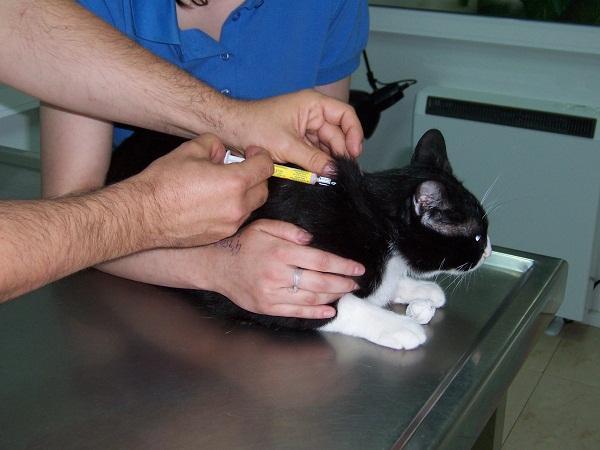What Is the Triple Vaccine for Cats?



See files for Cats
The trivalent vaccine for cats helps prevent common diseases. Specifically designed for cats, it protects against Feline Viral Rhinotracheitis (FVR), Calicivirus (C), and Panleukopenia (P). This vaccine boosts the cat's immune system, reducing infection risk, easing symptoms, and promoting overall well-being.
In the next AnimalWised article, we'll cover the trivalent vaccine's components, recommended schedules, potential side effects, and factors influencing vaccination decisions.
How do cat vaccines work?
Before we dive into the trivalent vaccine for cats, let's explore what vaccines are and why they matter. Vaccines are special formulations that contain modified or inactivated viruses. When given to a cat, they trigger the immune system to create defenses or antibodies that fight specific diseases.
If a vaccinated cat comes across a disease it has been vaccinated against, it already has the necessary defenses. This can lead to either no visible signs of the disease or milder symptoms. This is especially important for preventing severe diseases like panleukopenia, which can be fatal, especially for kittens.
Vaccination is crucial for kittens because their immune systems are still developing. It's also essential for cats with frequent interactions, since some diseases can be unintentionally transmitted through contact with shoes or clothing.
Veterinarians are vital in creating the right vaccination plan for each cat. They consider the cat's individual traits and living conditions to determine the most suitable vaccination schedule. Only licensed veterinarians should administer vaccines to ensure proper care.
Types of cat vaccines
There are different vaccines for cats, grouped as essential or optional. The trivalent vaccine, focusing on Feline Viral Rhinotracheitis, Calicivirus, and Panleukopenia, is considered essential. It plays a critical role in maintaining feline health and preventing serious diseases.

What does the trivalent vaccine cover?
The trivalent vaccine for cats is a combination vaccine designed to provide protection against three key feline diseases. The term "trivalent" indicates that the vaccine addresses three specific pathogens. In the case of the trivalent vaccine for cats, it typically includes protection against the following diseases:
Feline Herpesvirus (Rhinotracheitis)
Feline herpesvirus (FHV-1), also known as feline viral rhinotracheitis (FVR), is a common contagious respiratory virus that affects cats. It is one of the most prevalent causes of upper respiratory infections in cats, second only to feline calicivirus (FCV). FHV-1 is transmitted through direct contact with an infected cat, including sharing food bowls, water bowls, and litter boxes. It can also be transmitted through airborne droplets from an infected cat's sneeze or cough.
Feline Calicivirus (FCV)
Feline calicivirus (FCV) is a common and highly contagious virus that causes upper respiratory infections in cats. It is one of the leading causes of feline infectious respiratory disease (FIRD), also known as cat flu. FCV is a hardy virus that can survive in the environment for up to three weeks, making it easily transmitted between cats. FCV is spread through contact with an infected cat's saliva, nasal discharge, or feces.
Feline Parvovirus (Panleukopenia)
Feline parvovirus (FPV), also known as feline panleukopenia, is a highly contagious and potentially life-threatening viral disease that affects cats. It is particularly dangerous for kittens and cats with weakened immune systems. FPV attacks the rapidly dividing cells in the cat's body, including the cells in the bone marrow, intestines, and skin. FPV is spread through direct contact with an infected cat's feces, vomit, or urine.

When should cats receive the trivalent vaccine?
The trivalent vaccine is typically recommended for cats starting at an early age, often as part of their initial vaccination series.
Kittens are often given their first round of vaccinations, including the trivalent vaccine, at around 6 to 8 weeks of age, with subsequent booster shots given at intervals determined by the veterinarian.
The typical schedule for the trivalent vaccine may include:
- Initial vaccination series: kittens usually receive their first trivalent vaccine dose at around 6 to 8 weeks of age. This is often part of a series of vaccinations given at specific intervals, such as every 3 to 4 weeks, until the kitten reaches around 16 weeks of age.
- Booster shots: after the initial series, cats receive booster shots at regular intervals to reinforce immunity. The specific frequency of booster shots may vary but is often recommended annually or every three years, depending on the vaccine formulation and the veterinarian's guidelines.
This schedule helps ensure that cats develop immunity against the targeted diseases at a young age and maintain protection throughout their lives. However, the specific timing may vary based on individual circumstances, and it's always best to consult with a veterinarian for personalized advice.

Side effects of the trivalent vaccine in cats
The trivalent vaccine for cats, like any medical intervention, can potentially have side effects. It's important to note that side effects are generally mild and temporary. Common side effects may include:
- Mild discomfort: some cats may experience mild discomfort at the injection site.
- Lethargy: a temporary decrease in energy levels is a common and usually short-lived side effect.
- Loss of appetite: some cats may temporarily lose interest in food after vaccination.
- Fever: a slight increase in body temperature can occur but typically resolves quickly.
- Allergic reactions: though rare, some cats may have an allergic reaction to a component of the vaccine, leading to symptoms like facial swelling or difficulty breathing. Immediate veterinary attention is crucial in such cases.
It's essential for cat owners to be aware of potential side effects and report any unusual reactions to their veterinarian promptly.
While side effects are generally minimal, the benefits of vaccination in preventing serious diseases far outweigh the risks. Veterinarians can provide guidance on managing any side effects and ensure the overall well-being of the cat.
As you prioritize your cat's well-being with the triple vaccine, take a moment to familiarize yourself with the common side effects of other vaccines.
This article is purely informative. AnimalWised does not have the authority to prescribe any veterinary treatment or create a diagnosis. We invite you to take your pet to the veterinarian if they are suffering from any condition or pain.
If you want to read similar articles to What Is the Triple Vaccine for Cats?, we recommend you visit our Vaccination category.
AVEPA-GEMFE: "Vaccinate your cat." https://www.avepa.org/articulos/vacuna.html
WSAVA: "Guidelines for the vaccination of dogs and cats." https://wsava.org/wp-content/uploads/2020/01/WSAVA-vaccination-guidelines-2015-Spanish.pdf








